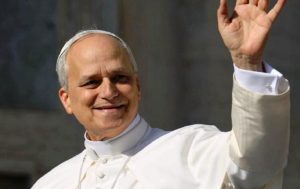Abraham’s “yes”, trusting in God’s word to him, should be a source of inspiration for all of Jesus’ missionary disciples.
Vocation is a gift from God, and all of us who are loved by God are called by Him. However, understanding our vocation also requires learning from many people who were called by God, who listened to Him and sought to follow Him.
In Abraham’s vocation, the initiative originated from God. It is God who calls and invites us to participate in the challenge He proposes. The initiative belongs to God because “He first loved us” (1 John 4:19).
When referring to Abraham’s call, the sacred text states:
“The Lord said to Abraham, ‘Get out of your country, from your kindred and from your father’s house, and go to the land that I will show you. I will make of you a great nation; I will bless you; I will make your name great; be a blessing! I will bless those who bless you, and curse those who curse you. Through you, all the peoples of the earth will be blessed’” (Genesis 12:1–3).
The response to God’s call is free. Abraham could choose whether to accept God’s invitation to leave or to stay in his land, ignoring it. Yet Abraham decided to leave. Moreover, Abraham was already seventy-five years old (Genesis 12:4), and Sarah, his wife, was considered barren (Genesis 11:30).
Abraham’s departure, more than a positive response to God’s call, exemplifies his complete trust in God. Leaving one’s land means abandoning the familiar to embrace the unknown: leaving family and friends, a region and country to which one belongs, a culture in which one is immersed, and the bonds formed along the way, in order to follow God’s path. Reflecting on Abraham’s life, we see that he was a just man who sought peace.
Despite his wealth in flocks, silver, and gold (Genesis 13:2), he chose to separate from Lot to prevent conflict between them, allowing Lot to select the best land: “The valley was a wonderful garden” (Genesis 13:10). Like Abraham, let us strive to be just men and women, living our lives in pursuit of peace and avoiding conflicts among brothers and sisters. As mentioned earlier, Sarah was barren and advanced in age. Yet God, faithful to His promises, granted her a son — Isaac! God upheld His promises (Genesis 17:15–19; 21:1–3).
Later, God decided to test Abraham by asking him to sacrifice his son Isaac. God was well aware of Abraham’s profound love for Isaac. Nevertheless, out of obedience to God, Abraham prepared to fulfil His command. Seeing Abraham’s obedience, God instructed him not to sacrifice Isaac. Through this act, God affirmed Abraham’s trust and obedience, marking him as a friend of God. Abraham’s “yes”, rooted in trust in God’s word, should serve as inspiration for all who embark on their journey.
When God speaks to our hearts (Hosea 2:16) and invites us to leave, His call is not without purpose, for He created us, knows us intimately, and understands our capacities. It is not an easy invitation but a demanding one, involving sacrifice — leaving family, friends, country, and culture we love — to faithfully embrace the destiny God has shown us. Similarly, in each of our lives, God calls us to leave our comfort zones and open our hearts, trusting in Him.
Leaving is demanding and may involve hardship, but as the late Pope Francis reminds us:
“I prefer a Church that is bumpy, wounded and muddy from going out on the roads, to a Church that is sick from closure and the comfort of clinging to its own security” (Evangelii Gaudium, n. 49).
We often do not understand God’s plans or His will. Nevertheless, our love for Him and trust in His love — believing that He desires the best for us — empower us to accept His often difficult will. Inspired by Abraham, we can remain faithful to the Lord and His call.
(Illustration: iStock/rudall30) – (Pedro Nascimento)









